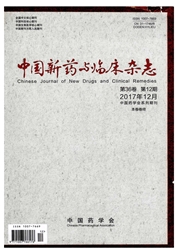

 中文摘要:
中文摘要:
目的探讨Toll样受体介导的炎症反应在下肢深静脉血栓(DVT)发病中的作用及消栓通脉颗粒治疗DVT的靶点-9机制。方法60例急性期DVT患者随机分为中西医结合组(结合组)30例和西药组30例。西药组给予尿激酶20万单位静滴,1次·d^-1,低分子肝素钙4100单位皮下注射,1次·d^-1,均连续用药14d。结合组在西药组基础上口服消栓通脉颗粒,每次10g,2次·d^-1,连续用药14d。30例健康查体者为正常组。RT.PCR法检测治疗前后外周血单核细胞中TLR2、TLR4、IL-6、TNF—α、IFN-γmRNA表达,测量患肢肢围变化,观察静脉再通情况。结果与正常组比较DVT患者外周血TLR2、TLR4与IL-6、TNF-α、IFN-γ mRNA表达均升高(P〈0.05),且TLR2、TLR4mRNA水平与IL-6、TNF-α、IFN-γ mRNA水平呈正相关(P〈0.05);结合组外周血TLR2、TLR4与IL一6、TNF-α、IFN-γ mRNA表达较治疗前显著降低(P〈0.05)。结论Toll样受体介导的炎症反应可能在DVT形成中发挥着重要作用,消栓通脉颗粒通过靶向TLR2、TLR4,减少炎性细胞因子产生,保护血管内皮细胞,从而对DVT有治疗作用。
 英文摘要:
英文摘要:
AIM To investigate the effects of Xiaoshuantongmai granules on inflammatory response mediated by Toll-like receptors (TLR2 and TLR4) in the treatment of deep venous thrombosis (DVT), and discuss the mechanisms by which Xiaoshuantongmai granules modulating inflammatory response mediated by Toll-like receptors. METHODS Sixty acute DVT patients were randomly allocated to control group or trialgroup. The patients in the control group were administered with urokinase (200 000 U, iv, qd) and heparin calcium injection (4 100 U, sc, qd) for 14 days, and the patients in the trial group were administered with urokinase (200 000 U, iv, qd), heparin calcium injection (4 100 U, sc, qd) and Xiaoshuantongmai granules (10 g, po, bid) for 14 days. Thirty healthy volunteers were recruited as normal group. The TLR2, TLR4, IL-6, TNF-α, and IFN-γmRNA of peripheral blood mononuclear cell were analyzed by RT-PCR before and after the treatment. The affected limbs were measured and the recanalization rates were observed. RESULTS Compared with the normal group, the expression of TLR2, TLR4, IL-6, TNF-α, IFN-γ mRNA in the control group and the trial group increased significantly (P 〈 0.05). In addition, the level of TLR2, TLR4 mRNA and the level of IL-6, TNF-α, IFN-γ mRNA were in positive correlation (P 〈 0.05). Compared with the control group, the expressions ofTLR2, TLR4, IL-6, TNF-α, IFN-γ mRNA in the trial group were downregulated obviously (P〈 0.05). CONCLUSION The inflammatory response mediated by Toll-like receptors may play an important role in the development of DVT, and can be downregulated by Xiaoshuantongmai granules, which might be the mechanism of Xiaoshuantongmai granules in the treatment of DVT.
 同期刊论文项目
同期刊论文项目
 同项目期刊论文
同项目期刊论文
 Up-regulation of Fas/FasL activation contribute to the apoptosis enhancement of RU486 by Gong-Qing D
Up-regulation of Fas/FasL activation contribute to the apoptosis enhancement of RU486 by Gong-Qing D 期刊信息
期刊信息
